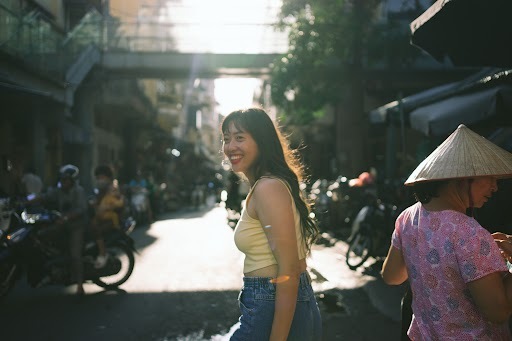プログラム参加者・TOMODACHIアラムナイに聞いてみました!タラヴェラ・アイカ・メイ氏

今回のインタビューは、2019-2020年度TOMODACHI MetLife Women’s Leadership Programの卒業生で、現在TOMODACHIシニア・アラムナイ・インターンを務めるタラヴェラ・アイカ・メイ氏にお話を伺いました。
彼女は、日米の各地域のアラムナイをつなぎ、互いに影響を与えあうことを目的としたTOMODACHIアラムナイ地域フレームワークの一員で、九州地区を代表する地域の主要メンバーでもあります。
自身の仕事においては、オンライン講座を通じて日本全国に滞在している米国軍関係者へ日本語を教えています。 彼女は日本の軍事基地の中で育った日本育ちの日系フィリピン人として、その経験を語ってくれました。休暇はフィットネスを楽しみ、最近はボディビルの大会にも挑戦しています。
Q1:日本の米軍基地の中で育った経験はどのようなものでしたか?
私の父は海軍に所属していたため、長崎、山口、神奈川など日本の米軍事基地の中で育ちました。引っ越しが多く、日本の様々な基地内を転々としていました。ありきたりに聞こえるかもしれないけれど、私は日米両国の良いところを体得してきたと感じています。日本の中にいながらアメリカを体感してきました。そういう状況下にあったことで、日本人の友達だけでなくアメリカ人の友達もいましたし、2つの文化が同時に楽しめるなんて最高でした。本当に楽しかったです。
Q2: TOMODACHI MetLife Women’s Leadership Programに参加しようと思った理由は何ですか?
このプログラムに応募しようと思った大きな理由のひとつは、メンター制度があったからです。基本的に10カ月間、メンターがつき、その方と1対1で仕事をします。メンターと1対1で仕事をするような形式的なプログラムや経験をしたことがなかったので、とても興味深かったです。実際、今でもメンターとはつながっているし、リーダーシップ・プログラムに参加することを決めて本当によかったと思っています。そこで多くの素晴らしいメンターと出会い、視野も広がったことで、自分自身をさらに成長させ、より大きな、より良いものを創造し、着手することができると気づかせてくれた。
Q3:プログラム中での一番の思い出はなんですか?
メンターの朝倉愛以さんは、現在TOMODACHIイニシアチブのために働いていますが、プログラム全体を通して本当に素晴らしい方でした。私たちは似たもの同士で、とても相性が良かったですし、彼女はわざわざ私を色々なところに誘ってくれました。このプログラムの重要なポイントのひとつは、人脈作りです。彼女は人脈作りがとても上手ですし、とても社交的で、福岡にたくさんの人とのつながりを持っています。彼女がリーダーシップや自己啓発についてどのように考えているのか、どうふるまうのかを見て、とても刺激を受けました。
Q4:プログラムで何を学びましたか?
私が学んだのは、基本的にネットワーキング力だと思います。自分では気づかなかったことですが、頼みごとをしたり、連絡を取ったりすることに関して、私は自分が思っているよりも少し内気だということに気づきました。頼みごとをするのは必ずしも好きではなかったし、遠慮していた。でも、助けを求めたり、わざわざお願いしたりしなければ、決して助けてもらえないということに気づきました。でも、人脈作りは必ずしも自分だけの問題ではない。自分が相手に何を提供できるかも考えなければならない。ネットワーキングの力は、私が学び、理解し、その重要性に気づいたものでした。
Q5: TOMODACHI アラムナイ・リーダーシップ・プログラムのインターンに興味を持ったきっかけはなんですか?
このプログラムに参加した年はCOVIDの年でした。[通常は] 9カ月が過ぎると、一緒に活動してきた人たちとアメリカに行くのですが、残念ながらCOVIDの関係で参加できなかったので、このプログラムが終わってしまうのは寂しいような、思っていたのと違うような気がしました。私はこのTOMODACHIのコミュニティの一員であり続けたかったのです。最初は福岡で開催されるイベントに参加したり、とにかく力になりたいと思っていました。そして、アラムナイ・ソーシャルメディア・インターンを募集しているのを見て、これなら私にもできるかもしれないと思ったんです。このプログラムは私に多くのものを与えてくれました。メンターたちは私を助けるために多くの時間を割いてくれた。だから、この組織が私にしてくれたのと同じ努力とエネルギーをお返しするために、私にできることは何だろう?と思ったからです。
Q6:先日インターンを更新されましたが、今後インターンとして達成したい目標はありますか?
今のところ、2つ思い浮かびます。まず、私の肩書きはシニア・アラムナイ・インターンです。新しいインターン生が安心してインターンについて理解できるようなタイプになりたいです。それが第一段階です。今、とても面白いのは、20代前半の私の人生は、私がメンティであることがすべてだったような気がすることです。でも今は、20代後半になるにつれて、メンターになりつつあると感じています。だから、今は人生の中でとても興味深い段階だと思います。自分がどんなメンターになりたいか、自分の人生の中でその部分をどのように実行したいかを考えることができる最初の段階です。このインターンシップを通じて、それを実践したいと思っています。そして2つ目は、このインターンシップの目的は、卒業生を結びつけることだと思います。アラムナイをどのように結びつけ、より強い絆と関係を作っていくかということに、もっと力を注いでいきたいと思っています。
Q7: 米国軍関係者に日本語を教える仕事のことをもう少し聴かせて頂けますか?
とても充実していて、本当に驚いています。ちょっと変な話ですが、教えることに楽しさや充実感を見いだせるとは思ってもみなかったんです。ただ、「これは私にしかできないスキルだ。だからやってみよう」と思ったところから軍関係者に日本語を教え始めました。しかし、本当にショックだったのは、言葉の壁がこれほど大きな役割を果たし、その人の人生に困難をもたらすとは思っていなかったのです。日本に来たくなかったけれど、夫が駐留しなければならなかったので、仕方なく来たという生徒がいました。でも、私のクラスを1年ほど受講した後、彼女は仕事を得て、日本のコミュニティーの一員となることができました。
Q8:フィットネスやボディビルに対する情熱はどこから来ていると思いますか?
スポーツをする環境で育ってきたので、フィットネスはいつも私の生活の一部でした。つい最近、ボディビルの初めてのショーを終えました。とても緊張しましたが、いい経験でした。基本的に、フィットネスは自分を律する方法を教えてくれますし、最高の自分になろうと努力させてくれるものだと思います。フィットネスやボディビルが教えてくれることは本当にたくさんあ利ました。私は常に規律を守ることに取り組んでいます。基本的には、様々なチャレンジができることを楽しんでいるだけです。
Q9: TOMODACHIや米日カウンシルがその問題に取り組む上で、どのような機会があるとお考えですか?
とても深い質問ですね。でも、軍事基地の中で育った私は、日本の軍事基地というコミュニティが非常に分離されているように感じられることに、いつも違和感を感じていました。ここがアメリカで、ここが日本みたいな。[手のジェスチャーで両者を示す)私は、両者のコラボレーションをもっと見てみたいと思っています。軍人の多くは、日本国内で地元の人々と交流する機会やチャンスがあまりありません。私は、この2つの間にもっと本物の関係を作りたいと思っていますし、この2つを融合させることに興味があります。
Q10: 自分にとってTOMODACHIとは何ですか?
私にとってのTOMODACHIとは、無欲であることです。TOMODACHIが舞台裏でどのように動いているのかを見る機会があってから、このコミュニティを作り上げているスタッフやメンバーの一人一人が、本当に無欲の人たちだと感じています。最終的に、人々に多くの機会を与え、自身を向上させ、本質的にすべての人にとってより良い世界を作りたいと考えているのだ。
このインタビューは2023年10月5日、ハンナ・フルトンによって行われました。ハンナは現在、TOMODACHI アラムナイ・リーダーシップ・プログラムのインターンであり、渡邉利三寄付奨学金プログラム2022-2023の修了生でもあります。


